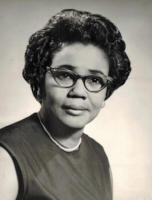Victorine Quille Adams
1912-2006

Victorine Quille Adams was the first African American woman elected to the Baltimore City Council. She served four terms from 1967 to 1983. Her tenure on the City Council inaugurated the continuous presence of African American women in Baltimore City politics. A native of the city, she sought to improve political representation, civic participation, and economic opportunity for all Baltimoreans.
Born on April 28, 1912, to Joseph and Estelle Tate Quille at Johns Hopkins Hospital, Adams attended Robert Brown Elliot School #104, Frederick Douglass High School, Coppin Normal School, and Morgan State College. All of these public institutions were historically schools for African Americans. In 1943, Victorine Q. Adams, Kate Sheppard, Juanita Jackson Mitchell, Vivian Alleyne, and Emma Dudley chartered the National Council of Negro Women Baltimore Section. These women campaigned for equity within the military during World War II.
In 1946, Adams founded the Colored Women's Democratic Campaign Committee (CWDCC). The CWDCC's motto was "If democracy is worth fighting for, it's worth voting for." Its initiative welcomed all, registered all, and enlightened all interested in placing more women in politics. Its first campaign resulted in the election of attorney Harry Cole to the Maryland State Senate, the first African American to be elected to that chamber. The CWDCC mobilized support for Verda F. Welcome, resulting in her election as the first African American woman in the Maryland State Senate in 1962.
At the CWDCC’s 50th anniversary in 1996, Adams was honored at a City Hall ceremony where many then African American office holders praised her work and service, including Helen L. Holton, who said that "She paved the way for all of us."
In 1948, Adams operated the Charm Center, the "only black-owned and operated" clothing store for women in Baltimore. She initiated Project Beauty and Charm, a six-week course offered to female residents ages 18 and older, designed to instill the confidence necessary for success in the public square, providing coaching in poise, presentation, and deportment.
On August 19, 1958, she and Ethel P. Rich co-founded Woman Power, Incorporated (WP), an organization focused on mobilizing African American women for political action and power, community involvement, and educational commitment. WP's motto was "Each one, reach one; each one, teach one." They believed every woman could teach something and every woman could learn something. Men were welcome to join the Minute Men, an affiliate of the WP.
In 1966, Adams successfully ran for the Maryland House of Delegates. She resigned in 1967 after winning a seat on the Baltimore City Council, where she served for 16 years representing the 4th District, until retiring in 1983. She created the Baltimore Fuel Fund, a public-private partnership that raised money from charitable contributions to help families needing financial assistance with heating costs. The Fuel Fund humanized government assistance that worked with poorer residents and other cities throughout Maryland replicated the program.
Adams married William L. "Little Willie" Adams, a widely known local leader in the numbers games who became a wealthy businessman and power broker, in 1935. She gained a stepdaughter, Gertrude Venable, through the marriage. Adams died at age 93 from Warthin’s tumor on January 8, 2006, and was buried at Arbutus Memorial Park in Arbutus, Maryland.
Adams did not crave attention but solutions to problems. An exemplary public servant, inspirational leader, and outstanding role model, she was a woman of great competence and compassion.
"I have paid my dues to Baltimore. I feel I should be regarded not only as (a) wife but as a woman who has used her influence and affluence to better the community in which she lives."
Biography courtesy of the Maryland Commission for Women, 2020; updated 2023.
